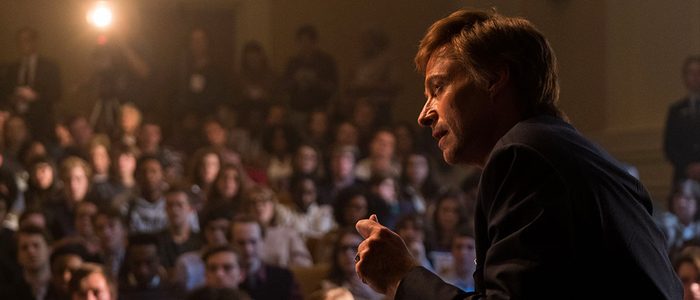TIFF 2018 Was Defined By Questions Of Inclusion And Identity
Art reflects the culture it's created in. In the '30s and '40s, directors like Frank Capra produced optimistic comedies and dramas to help uplift a national morale brought low by the Great Depression and World War II. In the late '70s and '80s, punk music and hip-hop spoke to political frustrations. Part of the value of the art that makes up popular culture is what a piece of music, literature or cinema can tell us about the prevailing cultural attitudes at the time it was made.
In this way, events like the Toronto International Film Festival are valuable not just as marketing tools by studios to kick off their awards campaigns, but as a way to show audiences what ideas are currently dominating our cultural conversation. By gathering the biggest, newest films in one place, festivals like TIFF invite the world to consider what's been on our collective minds, and provide a space to have a dialogue about it.
At this year's TIFF, those themes center around ideas of inclusion and identity, both in the films and as part of events outside the theaters. Those events include the Share Her Journey rally for women in film, and the TIFF Industry conference, which this year featured speakers like #oscarssowhite creator April Reign, and Annenberg Inclusion Initiative founder Dr. Stacy L. Smith.
Films at the festival have asked audiences to step into the shoes of a black family in 1960s New York (If Beale Street Could Talk), families dealing with addicted children (Beautiful Boy and Ben is Back) and a young gay man undergoing conversion therapy (Boy Erased), among many other characters. They've been asked to sympathize with a philandering politician in Jason Reitman's The Front Runner, and invited into dialogue with former Trump advisor Steve Bannon, in Errol Morris' stunning documentary American Dharma.

Part of the emerging narrative at the festival this year has been recognizing whose stories matter (the answer, in case you're wondering, is "everyone's"), and holding the film community accountable for who gets to tell those stories (mostly white men). The other part has been about asking audiences — and the world at large — who we are now, in the face of social and political events of the last few years, and how that's informed by who we have been.
We are living in a post-Me Too, post-Ferguson, post-Trump election world that's seen refugee crises, sexual harassment and assault revelations, and the government-mandated separation of families at the U.S.-Mexico border. For some, this feels like an a sharp, cruel turn from the world they thought they knew. For others, it's merely the mainstreaming of issues they've faced for years. Culturally, the world is at a crossroads, and that perspective is present across many of this year's films.
If Beale Street Could Talk, The Hate U Give and Monsters and Men remind audiences that issues of discrimination and racism have always been around, and of the complicated identities that make up life as a person of color. Nuance also defines the stories of addiction and mental illness presented in Beautiful Boy, Ben is Back and The Public. Questions about the changing nature of political and moral identity on a national level shape the stories of The Front Runner and American Dharma. And many other films at the festival bring audiences complicated characters whose questionable actions mask inner fears and vulnerabilities.

The artistic response to current issues from the filmmaking community has been equal parts "how did we get here?" and "what do we do now?" Do we really care about the treatment of women, people of color and LGBTQ individuals in public life? How should oppressed people deal with their oppressors? Is civil dialogue with people whose views we vehemently disagree with possible? Are we, essentially, good and generous, or have we always been motivated by fear?
If there's any hint at a response, it's present in these films' generosity toward characters that combine sympathetic and unsympathetic traits. In some of these stories, heroic characters make bad decisions — in the case of some of those characters, like Nicole Kidman's vengeful cop in Destroyer, or the selfish parents at the heart of Paul Dano's drama Wildlife, bad decisions the only kind they make. Others, like Monsters and Men present their main characters with equally valid courses of action in the face of a moral quandary, forcing them to decide where their motivations lie. The Front Runner rejects the idea of moral high ground entirely, with both the press and the political campaign they're covering left unsure as to who's in the right.
None of this is to say that the filmmakers are excusing reprehensible behavior, but merely that the nature of truth and identity is a complex thing. The world right now is in a state of re-identification, giving us the chance to either fix the wrongs we do to each other, or dig even deeper into the trenches. The films at this year's TIFF seem to recognize this current state. The attitude emerging from the festival appears to be that the sooner we can recognize the validity of other people's stories —the ones we understand and the ones we don't — the better chance we have at a more open, inclusive future.
